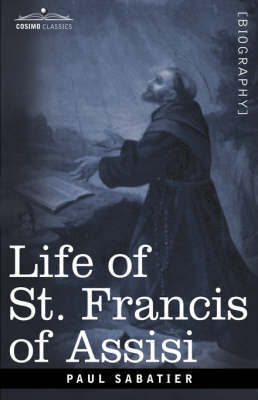 Having now finished Paul Sabatier’s Life of St. Francis of Assisi, I am ready to place it behind only Chesterton’s biography of Francis (and just above, I think, Englebert’s biography) as far as my favorites go (and this despite the fact that I suspect Chesterton would not have cared for Sabatier’s biography in many ways).
Having now finished Paul Sabatier’s Life of St. Francis of Assisi, I am ready to place it behind only Chesterton’s biography of Francis (and just above, I think, Englebert’s biography) as far as my favorites go (and this despite the fact that I suspect Chesterton would not have cared for Sabatier’s biography in many ways).
Sabatier’s biography handles ably the basic and, to students of Francis, well-known details of Francis’ life, but the reader is also presented with beautiful writing, profound force of conviction, and provocative interpretations along the way. I say “provocative” because what else might one call a book that was officially banned by the Vatican upon its arrival?
Sabatier very much saw Francis as a reformer. He does not deny Francis’ overtures of filial obedience to Rome, but Sabatier downplays these and emphasizes instead the many actions and words of Francis that can indeed be seen as prophetically subversive and challenging to the Church. Along the way, of course, Sabatier offers his own less than flattering views of institutional Roman Catholicism, but I daresay that, in my opinion at least, Sabatier never lapses into a kind of crude, thoughtless, vindictive anti-Catholicism.
It is hard to disagree with Sabatier’s image of Francis as somebody who demonstrated a startling independence even given his faithfulness to Rome. It is also hard to disagree that Francis’ life and teaching stood and stands in so many ways as a corrective to the more debilitating aspects of institutional Christianity. I would say, though, that Francis’ corrective pushes against all institutional manifestations, Catholic and Protestant.
I suppose this is why so many of us are drawn to the story of Francis: there is a prophetic challenge here that we all need even as we fear what it would mean to hear it. I am reminding of Chesterton’s exhilarating but fundamentally logical claim that to the extent that Francis was like Jesus Jesus was like Francis. True enough. And these are the parts of Francis that so entrance so many of us: the living out of the life of Christ in such radical simplicity, the courage, the fearlessness, the absolutely stupefying trust, and the joy.
Sabatier’s work is historically important and still provocative after all these years. It is well-informed and is clearly the product of a learned and sharp mind. It should be read.
